四级备考计划3篇
四级个人学习计划
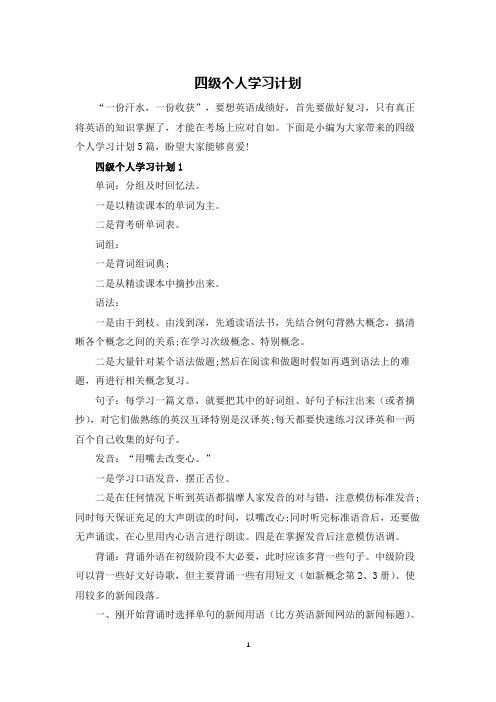
四级个人学习计划“一份汗水,一份收获”,要想英语成绩好,首先要做好复习,只有真正将英语的知识掌握了,才能在考场上应对自如。
下面是小编为大家带来的四级个人学习计划5篇,盼望大家能够喜爱!四级个人学习计划1单词:分组及时回忆法。
一是以精读课本的单词为主。
二是背考研单词表。
词组:一是背词组词典;二是从精读课本中摘抄出来。
语法:一是由干到枝、由浅到深,先通读语法书,先结合例句背熟大概念,搞清晰各个概念之间的关系;在学习次级概念、特别概念。
二是大量针对某个语法做题;然后在阅读和做题时假如再遇到语法上的难题,再进行相关概念复习。
句子:每学习一篇文章,就要把其中的好词组、好句子标注出来(或者摘抄),对它们做熟练的英汉互译特别是汉译英;每天都要快速练习汉译英和一两百个自己收集的好句子。
发音:“用嘴去改变心。
”一是学习口语发音,摆正舌位。
二是在任何情况下听到英语都揣摩人家发音的对与错,注意模仿标准发音;同时每天保证充足的大声朗读的时间,以嘴改心;同时听完标准语音后,还要做无声诵读,在心里用内心语言进行朗读。
四是在掌握发音后注意模仿语调。
背诵:背诵外语在初级阶段不大必要,此时应该多背一些句子。
中级阶段可以背一些好文好诗歌,但主要背诵一些有用短文(如新概念第2、3册)、使用较多的新闻段落。
一、刚开始背诵时选择单句的新闻用语(比方英语新闻网站的新闻标题)。
二、可以由浅入深地选择自己感兴趣的美文来背诵,背诵时着重背内容。
口语:(这些方法同样可以用来练习中文的口才)在听力的跟说、单双句重复的根底上,进一步以读说、听说为基矗平常可以找空闲时间做一些忆说、题说、1、读说。
复述刚刚读过的内容。
刚开始可以逐句复述,而后可以逐渐扩展至复述文章和段落。
复述中要特别注意关键词组和习语。
2、听说。
复述刚刚听到过的句子。
其他与“读说”类似。
两三个句子的复述能力是关键,在此根底上可以很容易地背诵、复述、口译。
3、忆说。
回忆自己曾经做过的事情,或者与他人谈话的内容,或者看过的电影、电视节目用英语复述出来。
2024年英语四级学习计划范本(三篇)
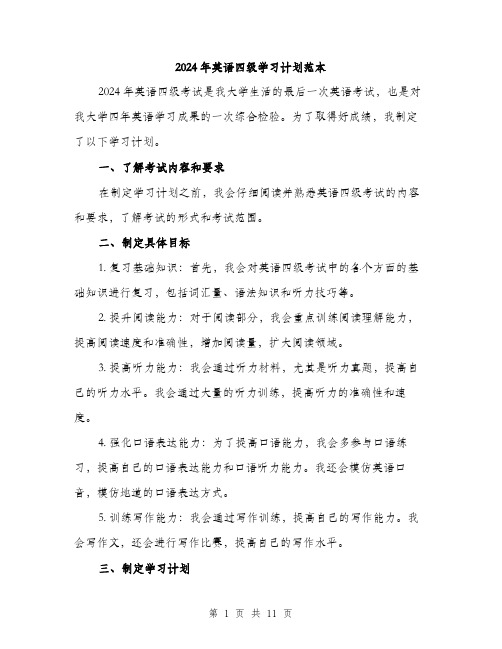
2024年英语四级学习计划范本2024年英语四级考试是我大学生活的最后一次英语考试,也是对我大学四年英语学习成果的一次综合检验。
为了取得好成绩,我制定了以下学习计划。
一、了解考试内容和要求在制定学习计划之前,我会仔细阅读并熟悉英语四级考试的内容和要求,了解考试的形式和考试范围。
二、制定具体目标1. 复习基础知识:首先,我会对英语四级考试中的各个方面的基础知识进行复习,包括词汇量、语法知识和听力技巧等。
2. 提升阅读能力:对于阅读部分,我会重点训练阅读理解能力,提高阅读速度和准确性,增加阅读量,扩大阅读领域。
3. 提高听力能力:我会通过听力材料,尤其是听力真题,提高自己的听力水平。
我会通过大量的听力训练,提高听力的准确性和速度。
4. 强化口语表达能力:为了提高口语能力,我会多参与口语练习,提高自己的口语表达能力和口语听力能力。
我还会模仿英语口音,模仿地道的口语表达方式。
5. 训练写作能力:我会通过写作训练,提高自己的写作能力。
我会写作文,还会进行写作比赛,提高自己的写作水平。
三、制定学习计划针对以上目标,我将制定具体的学习计划。
1. 复习基础知识:- 每天花30分钟复习词汇,并进行相关的词汇练习。
- 每周进行一次完整的语法知识复习,同时进行相关的语法练习。
- 每天听听力材料,提高听力水平。
2. 提升阅读能力:- 每天阅读一篇英文文章,提高阅读速度和理解能力。
- 每周进行一次阅读理解训练,包括做真题和模拟题。
3. 提高听力能力:- 每天听一段英语听力材料,同时做相关的听力练习。
- 每周进行一次听力训练,重点是听力真题和模拟题。
4. 强化口语表达能力:- 每周参与一次口语练习,与同学或英语老师进行口语对话练习。
- 每天模仿英语口音,通过模仿地道的口语表达方式提高口语水平。
5. 训练写作能力:- 每周写一篇英语作文,涉及各类题型。
- 参加写作比赛,提高写作水平。
四、总结与反馈我会定期总结学习情况并进行反馈。
专四备考策划书3篇

专四备考策划书3篇篇一《专四备考策划书》一、策划背景英语专业四级考试是英语专业学生在大学期间必须参加的一项重要考试,它对于学生的英语水平和专业能力有着重要的评估作用。
为了帮助同学们更好地备考专四考试,提高英语水平,特制定本策划书。
二、目标通过本策划书的实施,帮助同学们全面系统地复习专四考试的知识点,提高英语听说读写各项技能,增强自信心,顺利通过专四考试。
三、备考内容1. 听力:精听历年真题、听新闻、听英语电影等,提高听力理解能力。
2. 阅读:阅读英语文章、小说、新闻等,提高阅读理解能力和阅读速度。
3. 写作:背诵范文、写作文、批改作文等,提高写作水平。
4. 语法:系统学习语法知识,掌握重点语法点。
5. 词汇:背诵专四词汇,扩大词汇量。
四、备考资料1. 历年真题:购买历年专四真题,进行模拟考试和练习。
2. 听力材料:英语新闻、英语电影、英语歌曲等。
3. 阅读材料:英语文章、小说、新闻等。
4. 写作范文:背诵优秀的英语作文范文。
5. 语法书籍:系统学习语法知识的书籍。
6. 词汇书籍:专四词汇书。
五、备考计划1. 基础阶段(现在-6 月)背诵专四词汇,扩大词汇量。
学习语法知识,掌握重点语法点。
进行听力练习,精听历年真题和英语材料。
阅读英语文章,提高阅读理解能力。
2. 强化阶段(7-8 月)继续背诵词汇,巩固语法知识。
进行模拟考试,熟悉考试题型和难度。
针对听力、阅读、写作等专项进行训练,提高解题能力。
每天坚持练习口语,提高口语表达能力。
3. 冲刺阶段(9-10 月)复习重点知识点,查漏补缺。
继续进行模拟考试,提高应试能力。
阅读英语外刊,提高阅读理解能力。
背诵范文,提高写作水平。
4. 考前阶段(11-12 月)调整心态,保持良好状态。
复习错题,进行的冲刺。
按照考试时间和要求进行模拟考试,适应考试环境。
六、备考方法1. 制定计划:根据自己的实际情况制定合理的备考计划,合理分配时间,确保每个科目都有足够的复习时间。
英语四级学习计划
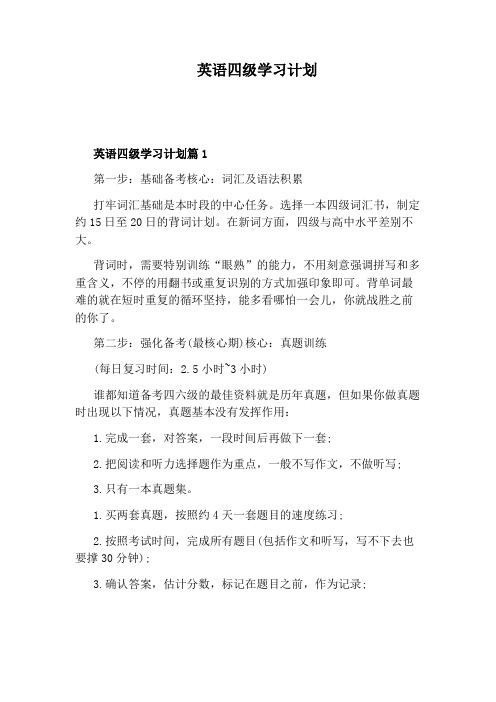
英语四级学习计划英语四级学习计划篇1第一步:基础备考核心:词汇及语法积累打牢词汇基础是本时段的中心任务。
选择一本四级词汇书,制定约15日至20日的背词计划。
在新词方面,四级与高中水平差别不大。
背词时,需要特别训练“眼熟”的能力,不用刻意强调拼写和多重含义,不停的用翻书或重复识别的方式加强印象即可。
背单词最难的就在短时重复的循环坚持,能多看哪怕一会儿,你就战胜之前的你了。
第二步:强化备考(最核心期)核心:真题训练(每日复习时间:2.5小时~3小时)谁都知道备考四六级的最佳资料就是历年真题,但如果你做真题时出现以下情况,真题基本没有发挥作用:1.完成一套,对答案,一段时间后再做下一套;2.把阅读和听力选择题作为重点,一般不写作文,不做听写;3.只有一本真题集。
1.买两套真题,按照约4天一套题目的速度练习;2.按照考试时间,完成所有题目(包括作文和听写,写不下去也要撑30分钟);3.确认答案,估计分数,标记在题目之前,作为记录;4.分析所有错题和不确定的题目(此环节可能需要看真题解析或询问高手或者老师),并且总结记录出现在准确选项,你选错的选项,答案对应原文等位置的生词;5.尝试翻译所有题目的准确答案项以及对应原文;6.听力至少再听两遍;7.努力记住第四步记录的单词或短语。
如此说来,完成一套真题的时间,至少在四个小时以上,1-4步和5-7步可以在两至三日内分别完成。
特别提醒,作文最好找老师或高手批改,否则自己写下去几乎没有提高。
第二轮:(5月21日至6月5日,每日复习时间:2.5小时~3小时)这段时间,拿出第二套真题集,抽取大约六套左右原来做过的题目重新做。
如果准确率极高,说明之前真题练习不错,反之则证明效果不佳。
要特别注意重复做错的题目。
这两个月是备考的黄金期,放弃了这一段时间,就等于放弃了所有过级可能性。
听课,接受引导式学习,是保证部分倍感自控无望的同学学习进度的最好方式。
第三步:冲刺备考核心:回顾错题,模拟考试(每日复习时间:2.5小时~3小时)几乎所有考试失败的前辈都会悲叹上场之后,考试时间不够,所以再次强化自己的考场能力成为最后时日的关键。
2024年英语四级学习计划(3篇)

2024年英语四级学习计划第一个月复习计划一、先是背单词,因为基础不好,对英语的理解力差,单词量就很重要。
我当时用的书是《淘金式分频词汇4级分册》,这本书的好处是,频率出现最高的单词会排在最前面,按照四级考试中出现的频率高低依次往后排,这样你就能从最重要的单词背起。
我每天背几个LESSON,第二天再把前一天背的复习一遍,再背新的LESSON,第三天把前两天的复习一遍,然后再背第三天要背的,单词能尽快背完最好,每天背几个LESSON的单词根据你自己的情况安排。
总体来讲,一个月之内最好背完。
(平均每天花____个小时)注:背单词的时候不要纯背单词,最好能好好看看例句,知道单词的具体用法,语境等等,这对做听力、阅读都是有好处的。
二、每天都坚持听听力一个半到两个小时,我当时还另外买了一本四级的辅导书,名字记不清了,好象叫《四级英语颠峰训练》(大概的名字)里面针对四级考试分项训练,差不多够你用一个月的时间了,第二个月,就可以做历年真题了。
(平均每天一个半到两个小时)注:开始听得时候也许有些关键地方会听不明白,不要先急于看答案和注解,多听几遍。
看答案的时候把自己听不明白和错误的地方仔细看看,里面有一些你不太清楚地固定短语,单词等等,把它们记下来,一般来说,四级英语的听力都在一定的范围内,你听精了,自然就没问题了。
三、阅读。
我阅读正确率开始的时候很低,我觉得我理解的原文的意思和真正的原文的意思好像有差距。
我当然明白四级阅读占的比例的重要性。
所以专门强化了阅读。
当时我看到网上推荐了一本书,叫《新编大学英语四级阅读____篇》,是上海交通大学潘晓燕主编,我当时的计划是每天做____篇,____篇做完刚好____天,我做这本阅读也是严格算时间做的,根据四级考试平均每篇阅读所需时间。
这本书也是第一个月要做完的,第二个月是要做真题用的。
最后考下来我阅读大概是____%的正确率吧。
注:虽然量变产生质变,但是也不能一味闷头去做,做阅读也有技巧的,首先先看下面的问题,带着问题有目标的看阅读,正确率会比较高,如果遇到时间不太够的情况,你可以看每段开头第一句,这样也能帮你提高蒙答案的正确率。
四级英语复习计划
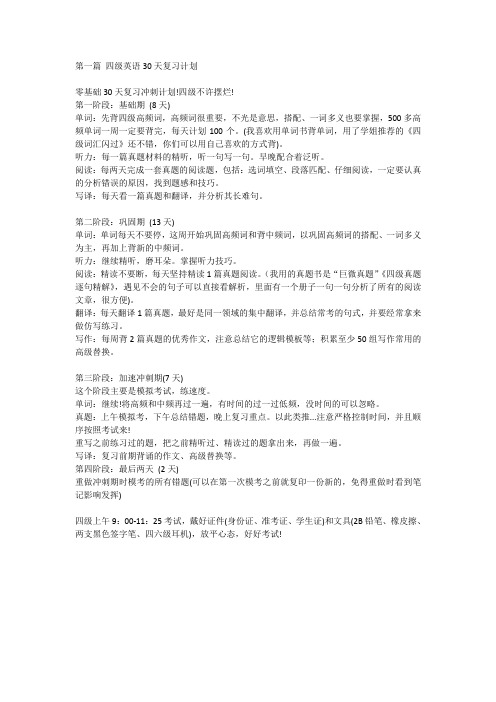
零基础30天复习冲刺计划!四级不许摆烂!第一阶段:基础期(8天)单词:先背四级高频词,高频词很重要,不光是意思,搭配、一词多义也要掌握,500多高频单词一周一定要背完,每天计划100个。
(我喜欢用单词书背单词,用了学姐推荐的《四级词汇闪过》还不错,你们可以用自己喜欢的方式背)。
听力:每一篇真题材料的精听,听一句写一句。
早晚配合着泛听。
阅读:每两天完成一套真题的阅读题,包括:选词填空、段落匹配、仔细阅读,一定要认真的分析错误的原因,找到题感和技巧。
写译:每天看一篇真题和翻译,并分析其长难句。
第二阶段:巩固期(13天)单词:单词每天不要停,这周开始巩固高频词和背中频词,以巩固高频词的搭配、一词多义为主,再加上背新的中频词。
听力:继续精听,磨耳朵。
掌握听力技巧。
阅读:精读不要断,每天坚持精读1篇真题阅读。
(我用的真题书是“巨微真题”《四级真题逐句精解》,遇见不会的句子可以直接看解析,里面有一个册子一句一句分析了所有的阅读文章,很方便)。
翻译:每天翻译1篇真题,最好是同一领域的集中翻译,并总结常考的句式,并要经常拿来做仿写练习。
写作:每周背2篇真题的优秀作文,注意总结它的逻辑模板等;积累至少50组写作常用的高级替换。
第三阶段:加速冲刺期(7天)这个阶段主要是模拟考试,练速度。
单词:继续!将高频和中频再过一遍,有时间的过一过低频,没时间的可以忽略。
真题:上午模拟考,下午总结错题,晚上复习重点。
以此类推...注意严格控制时间,并且顺序按照考试来!重写之前练习过的题,把之前精听过、精读过的题拿出来,再做一遍。
写译:复习前期背诵的作文、高级替换等。
第四阶段:最后两天(2天)重做冲刺期时模考的所有错题(可以在第一次模考之前就复印一份新的,免得重做时看到笔记影响发挥)四级上午9:00-11:25考试,戴好证件(身份证、准考证、学生证)和文具(2B铅笔、橡皮擦、两支黑色签字笔、四六级耳机),放平心态,好好考试!一、四级基本题型+考试时间分配四级总分710分,其中听力阅读各248.5分,各占比35%。
英语四级备考计划应用文写作
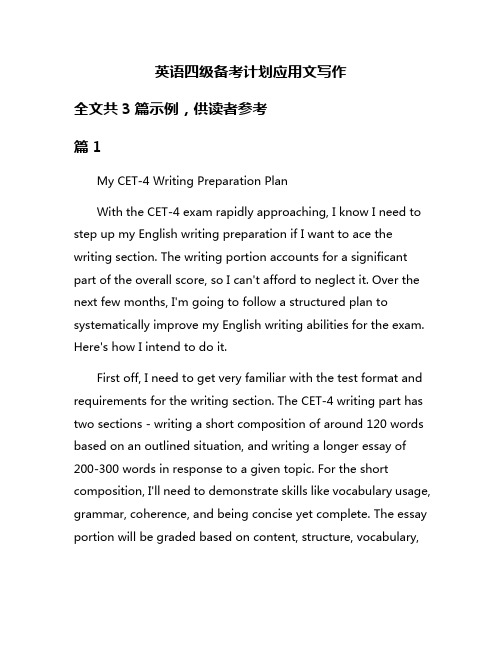
英语四级备考计划应用文写作全文共3篇示例,供读者参考篇1My CET-4 Writing Preparation PlanWith the CET-4 exam rapidly approaching, I know I need to step up my English writing preparation if I want to ace the writing section. The writing portion accounts for a significant part of the overall score, so I can't afford to neglect it. Over the next few months, I'm going to follow a structured plan to systematically improve my English writing abilities for the exam. Here's how I intend to do it.First off, I need to get very familiar with the test format and requirements for the writing section. The CET-4 writing part has two sections - writing a short composition of around 120 words based on an outlined situation, and writing a longer essay of 200-300 words in response to a given topic. For the short composition, I'll need to demonstrate skills like vocabulary usage, grammar, coherence, and being concise yet complete. The essay portion will be graded based on content, structure, vocabulary,grammar, and overall fluency. Knowing these criteria will allow me to focus my preparation appropriately.One of the biggest challenges I face is improving my linguistic competency - especially enriching my vocabulary and honing my grammar skills. I plan to set aside dedicated time each day to systematically study common lexical chunks, idiomatic expressions, academic phrases, and grammatical structures that are likely to appear on the exam. Using apps, websites and books specifically designed for CET preparation will give me ample practice exercises to drill these aspects.However, rote memorization alone won't cut it. I need to get plenty of practice applying this knowledge in actual writing scenarios. For the daily composition practice, I'll go through model essays and outline the structure, make note of transitional words used, observe how ideas are developed coherently, and analyze techniques for writing engaging introductions and conclusions. Then I'll try to replicate these elements in my own writing while swapping the topics and content.I also need to work on time management, as the CET writing tasks have to be completed within a specified duration. Setting a timer and doing timed writing exercises frequently will help build my skills in this area. I'll assess which areas slow me down - is itstruggling to quickly organize my thoughts, paralysis in starting the piece, overly laboring on word choices, or getting stuck on certain grammatical constructions? Identifying and resolving my personal bottlenecks here is key.In addition to practicing on my own, I plan to get regular feedback from teachers, peers, and online writing tutors. Having a fresh set of eyes critique my work can reveal blind spots in my writing that I may be oblivious to. I'll make use of campus writing centers as well as affordable online tutoring services to get this valuable external perspective and personalized advice.Reading also can't be neglected if I want to broaden my linguistic skills. I'll read material from high-quality English publications, journals, well-written blogs and books to get exposed to proper writing styles and soak in vocabulary in context. Dissecting how accomplished writers seamlessly blend words into sentences and paragraphs will be very useful. Taking notes of impressive phrases, analyzing transition usage, and outlining essay structures will all contribute to my writing prowess.Leading up to the exam, I'll make a habit of attempting full Writing Section practice tests from previous CET exams and other sources. This will get me acclimated to the actual testenvironment and allow me to apply all my learning in a comprehensive manner. I can then objectively assess my areas of strength and weakness based on the scored results.Periodically, I'll give myself short breaks to refresh my mind and return to preparation feeling re-energized. Sustaining a good balance of practice, feedback, and focused rest will be vital to avoiding burnout and stagnation. Motivational self-talk, visualizing success and little rewards will also aid in keeping my spirits high when I inevitably face minor setbacks along the way.Ultimately, consistent daily practice with the right techniques is the crux of making substantial improvements to my English writing proficiency. But this isn't a solitary journey - staying connected with teachers, classmates, and peers who are all striving towards the common CET goal will create a supportive environment. Together we can push each other to gives our utmost best on the exam day.I feel extremely determined to execute this writing plan flawlessly over the next few months. The effort and sacrifices made today will undoubtedly translate into exceptional results in the long run. I'm excited to watch my progress unfold as I work through this step-by-step writing agenda. With clarity ofpurpose and steadfast discipline, scoring well on the CET-4 writing section is certainly an achievable target!篇2My CET-4 Writing Preparation PlanAs an English major student, passing the College English Test Band 4 (CET-4) is extremely important for my future career prospects. The writing section, in particular, requires substantial practice and preparation. In this essay, I will outline my comprehensive plan to ace the CET-4 writing tasks.First and foremost, I need to thoroughly understand the test format and requirements. The CET-4 writing section consists of two tasks: Writing a composition (30% of the total score) and writing a letter (15% of the total score). The composition could be an argumentative, expository, or descriptive essay on a given topic, while the letter involves writing either a semi-formal or informal letter based on a specific situation.To excel in the composition task, I must work on developing a strong essay structure. A well-organized five-paragraph essay with an introduction, three body paragraphs, and a conclusion is generally expected. The introduction should capture the reader's attention, provide background information, and present a clearthesis statement. Each body paragraph should focus on one main idea, supported by relevant details, examples, and logical reasoning. The conclusion should summarize the main points and restate the thesis in a compelling way.Regarding the letter task, I need to familiarize myself with the appropriate formatting, tone, and content for bothsemi-formal and informal letters. Semi-formal letters may involve writing to a company, organization, or authority figure, while informal letters are typically written to friends or family members. Proper salutations, closings, and language register are crucial for each type of letter.To improve my writing skills, I plan to follow a multi-pronged approach:Extensive Reading: Reading high-quality English texts, such as newspapers, magazines, and academic journals, will expose me to a wide range of vocabulary, sentence structures, and writing styles. I will actively note down new words, phrases, and expressions to incorporate into my writing.Writing Practice: Consistent practice is the key to mastering any skill, and writing is no exception. I will set a goal to write at least one essay or letter per week on various topics. This will helpme become more comfortable with expressing ideas coherently and concisely in English.Feedback and Revision: After completing each writing practice, I will seek feedback from my English professors, tutors, or peers. Their constructive criticism will help me identify areas for improvement, such as grammar, word choice, organization, and logical flow. I will revise my work based on their feedback, which will reinforce my learning.Model Essays and Letters: Studying well-written sample essays and letters from reliable sources will provide me with a better understanding of effective writing techniques. I will analyze the structure, language, and rhetorical devices used in these samples to enhance my own writing abilities.Time Management: During the actual CET-4 exam, time management is crucial. I will practice writing under timed conditions to develop the skill of expressing my thoughts clearly and concisely within the given time frame.Vocabulary Building: A strong vocabulary is essential for effective writing. I will create flashcards or usevocabulary-building apps to learn new words, idioms, and collocations regularly. Additionally, I will strive to use a diverse range of vocabulary in my writing practice.Grammar Review: While grammar is not directly tested in the CET-4 writing section, it plays a significant role in conveying ideas clearly and accurately. I will review grammar rules, focusing on areas where I tend to make mistakes, such as subject-verb agreement, verb tenses, and article usage.Peer Collaboration: Working with classmates who share the same goal can be extremely beneficial. We can exchange writing samples, provide feedback, and discuss strategies for improvement. This collaborative approach will not only enhance our writing skills but also foster a supportive learning environment.In addition to these strategies, I will explore online resources, such as writing blogs, forums, and websites dedicated to CET-4 preparation. These resources can provide valuable tips, sample materials, and guidance from experienced educators andtest-takers.Passing the CET-4 writing section requires dedication, consistent effort, and a well-structured preparation plan. By following this comprehensive approach, I am confident that I can develop the necessary skills to effectively communicate my ideas in written English and achieve a high score on the CET-4 writingtasks. This, in turn, will open up numerous opportunities for further academic and professional growth.篇3Acing the Writing Section: My CET-4 Preparation GameplanAs an English major gearing up for the CET-4 exam, one section fills me with trepidation more than any other – the writing. Those two dreadful essays looming over the exam strike fear into the hearts of even the most seasoned writers among us. How can we possibly convey our brilliance and mastery of the language within those constrictive time limits and vague prompts?Fear not, my fellow test warriors! I've been researching and developing a comprehensive gameplan to conquer this writing Everest. By incorporating the right strategies and mindset, we can walk into that exam confident that our pens will weave linguistic magic.First things first, we need to analyze the enemy. What exactly are the examiners looking for in these writing samples? After poring over previous tests and scoring rubrics, a few key elements emerge:Organization and logical flow of ideasGrammatical accuracy and range of vocabularyAdhering to the assigned topic and task requirementsCoherence, cohesion, and transitions between thoughtsRather than aimlessly practicing essays, we must systematically target and improve upon each of these areas. Let's break it down:Organization is paramount. We need a battle-tested template to structure our writing in a clear, logical manner that guides the reader. I recommend the classic 5-paragraph format: an engaging introduction, 3 body paragraphs, and a synthesizing conclusion. By nailing this framework, we provide a readable roadmap rather than a muddled stream of consciousness.Next up, grammar and vocabulary. The CET-4 loves to test our range, so we must50expand our arsenal of transitional phrases, idioms, and advanced vocabulary. I've been building custom flashcard decks and quizzing myself daily on these linguistic tools. Mistakes in grammar or using overly simple words are a fast-track to point deductions.Adhering to the prompt sounds easy in theory, yet many test-takers fumble by going off on tangents. We must practice laser-focused responses that directly address the task at hand,no matter how closed or open-ended. I suggest underlining or highlighting all components of the essay prompt, and referencing it frequently during writing to ensure comprehensive coverage.The final key is coherence and flow. Our arguments and examples must smoothly tie together, with logical bridges joining each concept. Transitions like "additionally", "in contrast", and "for instance" are crucial for this. I've also found that techniques like outlined planning and reverse-outlining can help us organize and sequence ideas.With the criteria understood, the next step is to practice...A LOT. My strategy involves timed writing exercises using actual past prompts, grading myself against the rubrics, and analyzing areas for improvement. I set aside dedicated blocks each week for this training, challenging myself to work under authentic exam constraints. It's incredible how much more fluent my writing has become with this repeated exposure.During this practice phase, I cannot overstate the value of targeted feedback. Having teachers, writing tutors, and qualified peers review my work has accelerated my growth exponentially. An outside perspective highlights gaps and habits I could notperceive myself. I've even joined an online CET-4 writing group where we exchange essays for reciprocal critiques.In terms of content, we need a stockpile of exemplary sample essays to model our own writing after. I've compiled high-scoring examples across a variety of themes like education, technology, culture, and environment. Studying their techniques for introductions, thesis statements, body paragraphs, concluding remarks, and use of evidence has been invaluable. Where possible, I've even tried to emulate the admirable writing while making it my own.Time management is also crucial on test day. In my practice sessions, I've been getting used to budgeting my time per essay component. For instance, 10 minutes for outlining and planning, 25 minutes for writing the body paragraphs, 5 minutes for the intro and conclusion. Having a solid timeboxing system prevents me from wandering off track or running out of time before completing both essays.In the final stretch before the exam, my plan includes some mental conditioning as well. Plenty of rest, positive visualization, calming exercises, and strategic nutritional choices will ensure I'm feeling my best come test day. The mind and body work in tandem, so nurturing both is vital.As I step into that exam room, pens metaphorically blazing, I'll remember one key mantra: Confidence, not arrogance. Yes, I've prepared diligently and have full command of the skills needed to succeed. However, I'll couple that self-assurance with level-headedness and humility, reminding myself that the test is simply an opportunity to validate my hard work.With this gameplan, I'm ready to face the writing Goliath. Those two essays don't seem quite so daunting anymore. Let's show the examiners what we're capable of, one beautifully structured paragraph at a time! Who's with me?。
四级考试复习计划

四级考试复习计划篇一:四级考试复习计划一、基础阶段:(8月9月20日)。
1、背单词买一本单词书每天100个单词把中文意思一定要背过会拼写争取在一个月内把袭击的约4500个单词全部过一遍有个大体印象;2、看课本新视野大学生英语每天读两篇把结构比较好的句子画下来多看几遍能背则背语法不需要背如果实在不懂就不用看语法了;3、练听力在基础阶段时不需要练习考试听力可以从网上下载一些voa的慢速英语因为四级的听力语速很慢每天只需要听一篇但是一定要一边听一遍写知道能把英语都写下来无论听多少遍;4、写作写作方面不用下太多功夫背作文框架就可以(我给过你一本小册子就是英语作文的框架在一个月前背过就行)。
二、强化阶段:(9月20日11月)。
1、背单词将单词开始背第二遍这一遍要求记牢无论中文意思还是拼写都要记住每天150个此外还要背一些词组单词永远是最重要的单词量不过关什么也不行;2、看阅读将历年的四级真题的阅读一篇一篇的看难度并不大自己好好分析对照答案的说明然后做一遍如有不懂可请教他人每天一篇每份真题有两篇仔细阅读一篇快速阅读从xx年到20xx年大约一共有82篇只需要把这些文章分析的彻底问题就不大;3、练听力还是以voa的听力为主每天一篇写下来再对照答案。
三、冲刺阶段:(11月12月20日)。
1、背单词再将单词从头至尾背一遍直到考试单词至少要背三遍如果学有余力掌握拼写另外将所做的阅读真题里的陌生单词都整理到一张纸上不要写中文意思只写英文然后每天有空拿出来背一背效果显著词是基础;2、练听力这个阶段一定要开始练习历年真题的听力了每天做一篇即可与背单词相同的是也要将听力文章里出现的陌生单词整理到纸上不标注中文意思找空闲时间、背一背在听听力的时候要训练自己只听一遍不可以一道题听很多遍那样事倍功半在听听力题的最后一个大题复合式听写时听句子时候听主干只写主干一样得分;3、做阅读将做过的阅读在重新看看哪里还有不懂及时解决在做快速阅读时不要先看文章要先看题目从题目去文章中定位做大阅读的方法一样;4、写作四级的写作可以说就是考议论文议论文就是分三段每一段的句首的作用举重若轻就按照我给你的那本册子背就可以如有不理解请教他人;5、翻译同样将历年真题一道一道的认真做下来每做完几年的就做一个对比会发现知识点都是重复出现的翻译相对简单;另外如果认为背单词太累且记不住还可以尝试这样一种方法从基础阶段就开始做真题在阅读中去背单词将所有不会的单词都记录下来整理到本子上背就可以了但是这种方法并不是很扎实。
- 1、下载文档前请自行甄别文档内容的完整性,平台不提供额外的编辑、内容补充、找答案等附加服务。
- 2、"仅部分预览"的文档,不可在线预览部分如存在完整性等问题,可反馈申请退款(可完整预览的文档不适用该条件!)。
- 3、如文档侵犯您的权益,请联系客服反馈,我们会尽快为您处理(人工客服工作时间:9:00-18:30)。
四级备考计划3篇
(1435字)
首先,对于任何一门考试,第一步要做到的是了解考试,了解其特点从而更好的去着手应对。
其次,我们可以有的放矢的把复习备考阶段分为三个阶段:基础阶段,强化阶段,以及冲刺阶段。
四级基础阶段学习计划(1月-2月)
本阶段主要为后期复习打基础。
首先是贯穿四六级复习全程的词汇学习。
词汇记忆分为熟悉和深化两个阶段。
本阶段为熟悉阶段,需要总揽学习大纲词汇的各个解释,尤其标注熟词生义;利用词根词缀把单词进行分类记忆。
另外,一定注重语法的学习。
虽然XX年之后的四六级英语真题中并没有直接考查语法题,但无论是在阅读还是翻译、写作题目中,无不考查语法功底。
因此,学员在基础阶段一定要强调对语法理论与应用的把握。
最后,对真题的学习也要提上日程。
主要以真题为主,对其精读、研读,掌握文中词汇,分析解题思路。
在基础阶段,通过对词汇与语法的系统学习,再加上对阅读的实践,提升英语理解能力,为后期学习打基础。
四级强化阶段学习计划(3月-5月)
本阶段主要以真题为主,完成XX-XX年所有真题。
(点击查看历年四级真题>>)并分析错题原因,及时进行查漏补缺。
此阶段更加关注做题技巧和思路,及时进行反思和理解。
重点练习自己的薄弱单项进行系统化的强化练习。
下面就各个单项总结出合理的复习计划和任务。
233网校真题推荐:XX年12月大学英语四级真题(233网校)|答案解析(233网校)
听力:首先必须做到能够认识历年真题选项和原文中的所有单词。
并且通过上课以及练习真题的过程中基本了解并掌握听力简单听题技巧。
听力汇总:大学英语四级历年听力真题mp3下载及原文
(877字)
基础阶段:(分小组学习4~6月)
具体内容:
1、背单词买一本单词书,每天50个单词,把中文意思一定要背过,会拼写,争取在三个个月内把资料上的单词全部过一遍有个大体印象。
英语基础不好的同学对英语的理解力差,单词量很重要。
2、练听力在基础阶段时不需要练习考试听力,可以从网上下载一些慢速英语因为四级的听力语速很慢,每天只需要听一篇,尽可能地听清楚所有的内容。
3、看课本新视野大学生英语,每天读两篇,把结构比较好的句子画下来,多看几遍,能背则背,语法不需要背,但是要尽可能弄懂。
4、写作以背为主,先背作文框架,再背范文,熟记之后默写下来,对照找出其中出现的错误(一般的备考资料里都有一本小册子,上面有英语优秀范文和常用框架)。
时间安排:
早自习:用30分钟时间读英语,包括单词和作文。
(重点词汇做特殊标记)晚自习:用30分钟时间复习早上所记的英语,并默写作文。
(将不熟悉的单词及语法标记出来)
临睡前:花30分钟听英语
周一下午:选择某一主题,全班集体进行写作训练,小组内互相交换评改。
周五晚上:小组成员交流学习进展,共同探讨出现的问题。
强化阶段:(9~10月)
1、真题训练每周安排固定的时间做两套四级真题,严格按照四级规定的时间和流程要求作答。
答完题之后及时核对并弄清错误的原因,并将关键点和难点标记。
2、弱项强化每个人可以根据自身情况分项训练,特别是针对在阅读理解上耗时过长的特点,可以强化阅读理解训练。
每天坚持阅读做5篇文章,也是要按照四级规定的时间内完成。
做阅读也要把握技巧,首先先看下面的问题,带着问题有目标的看阅读,正确率会比较高,如果遇到时间不太够的情况,你可以看每段开头第一句,这样也能帮你提高猜答案的正确率。
冲刺阶段:(11~12月)
1、将之前所标记的单词、固定句型等重新记忆,争取做到牢固掌握。
2、这个阶段的听力训练要提高难度,可以听一些语速较快的英语,或者是往年的四级听力反复地听,培养考场听力的感觉。
3、将做过的阅读再重新看看,哪里还有不懂及时解决,提高浏览的速度,达到既快又精的效果。
4、将历年真题拿出来对比整理,找出重复出现的知识点并记忆。
